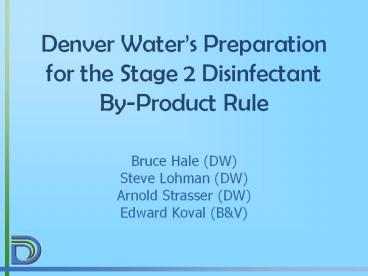Denver Water - PowerPoint PPT Presentation
1 / 27
Title:
Denver Water
Description:
Denver Water's Preparation for the Stage 2 Disinfectant By-Product Rule. Bruce Hale (DW) ... Denver Water stats. 3 Surface water treatment plants (WTPs) ... – PowerPoint PPT presentation
Number of Views:69
Avg rating:3.0/5.0
Title: Denver Water
1
Denver Waters Preparation for the Stage 2
Disinfectant By-Product Rule
- Bruce Hale (DW)
- Steve Lohman (DW)
- Arnold Strasser (DW)
- Edward Koval (BV)
2
Important Stage 2 features
- New Distribution System (DS) definitions
- Locational Running Annual Average (LRAA) MCLs
- Significant Excursions
- Phased compliance
- Initial Distribution System Evaluation (IDSE)
3
Finding new Stage 2B monitoring sites w/ IDSE
- Under early schedule, IDSE results due 2 yrs
from promulgation - See EPA Stage 2 Guidance Manuals
http//www.epa.gov/safewater/stage2/index.html
4
IDSE options
- Standard Monitoring Program (SMP)
- System-specific Study (SSS)
5
Denver Water stats
- 3 Surface water treatment plants (WTPs)
- Max. treatment capacity 710 MGD, chloramine
- Max. day 500 MGD
- Base day 120 MGD
- Total combined pop. served 1.1 million, 50
in over 60 consecutive systems - Water may be served from any operating WTP to any
part of combined DS - Any, or all WTPs may operate at the same time
6
Denver will opt for a SSS IDSE
- DW combined system too complex for SMP
- DW has computer model to assist w/ site selection
- Water age provided by model, main factor
influencing DBPs from respective WTPs - DW already has much data IDSE is intended to
uncover
7
Routine DS monitoring programs
- Regulatory DBP (HAA/THM) monitoring 12 sites,
monthly - VOC monitoring 9 sites, 8 times/year
- Sp. Conductance checks 20 sites, weekly
- Regulatory total chlorine monitoring 500
samples/month
8
What months have highest historical DS DBPs?
9
Monthly DS Max. TTHM profile
10
Hypothetical LRAA w/ monthly DS Max values
11
Rationale for evaluating sites with a single
sample event
- Unable to identify typical DS operations
- Sample when all plants in service
- Sample when DBPs are high, to make differences
between sites more evident - Historical data available for context
- Sites chosen evaluated with all-pipes model
(APM)
12
Key APM products
- At any DS location, percent composition by water
source (WTP) - Water age at any DS location.
13
APM Validations Extended Period Simulations (EPS)
- Hydraulic validation max day
- Water Age validation base load day
- Source trace validation 3 potentially high DBP
production days
14
Basis for choosing IDSE sample sites
- Prior knowledge
- Foothills WTP produces highest DBPs
- Foothills WTP treats the most water has largest
service area - HAAs THMs trend the same in the DS
- APMs water age representation
- APMs source water identification
15
September 9, 2003 Water Age Analysis
Moffat WTP
Marston WTP
Foothills WTP
16
September 9, 2003 Foothills WTP Source Trace
Moffat WTP
Marston WTP
Foothills WTP
17
September 9, 2003 Moffat WTP Source Trace
Moffat WTP
Marston WTP
Foothills WTP
18
How many sites will DWs SSS cover?
- Under the DS entry point scenario 24
- Under the population-based scenario 32
19
Distribution of 32 sample sites using SMP
guidelines
- 1 first customer site for each WTP
- Priority given to sites likely served by
Foothills WTP - 9 Max residence sites
- 5 Avg residence sites
- 5 Sites of max residence w/ blends
- 4 Sites of avg residence w/ blends
- 2 Max residence sites each, from Moffat and
Marston WTPs
20
Distribution of 32 sample sites (cont.)
- 2 Avg residence sites each, from Moffat and
Marston WTPs - Blends of Moffat and Marston insignificant
- 50 are new sites not used in DW monitoring
programs - No Stage 1 sites
21
DW tests SSS strategy in Aug, 2004
- 32 sites sampled on one day
- All sites tested for HAAs THMs
- Field tests at each site
- Specific conductance
- Total chlorine
- Temperature
22
(No Transcript)
23
(No Transcript)
24
(No Transcript)
25
Foothills first customer
26
Study Conclusions
- Study was successful
- Reflected bias towards Foothills DS
- Found some sites with high DBPs
- Level of TTHM LRAA MCL was exceeded at one site
only, and not at all for HAA5 - No site exceeded proposed excursion levels
- Confirmed THMs and HAAs act similarly
- The ratio of Foothills water is the main
influence on DBPs at any single site.
27
Acknowledgements
- Royce Bennett
- Rhonda Birdnow
- Fred Sanchez
- Janice Vaughn
- Greg Zempel































